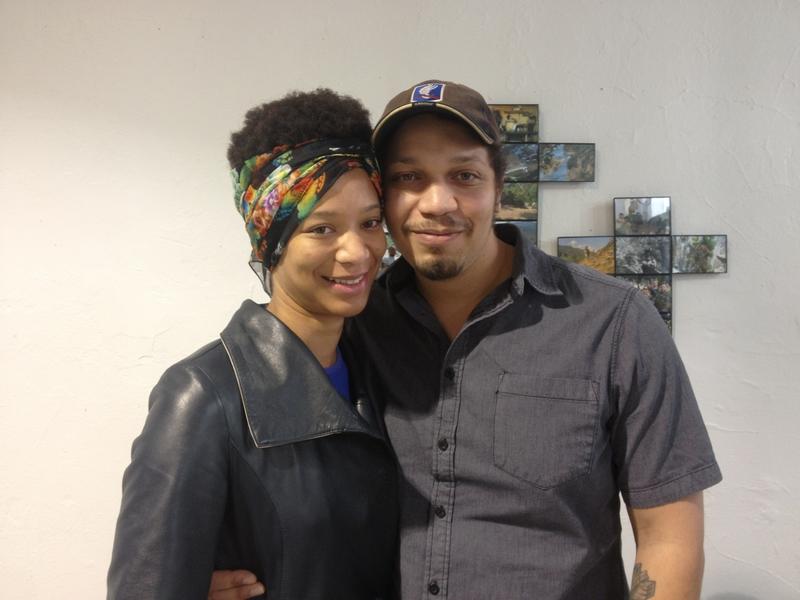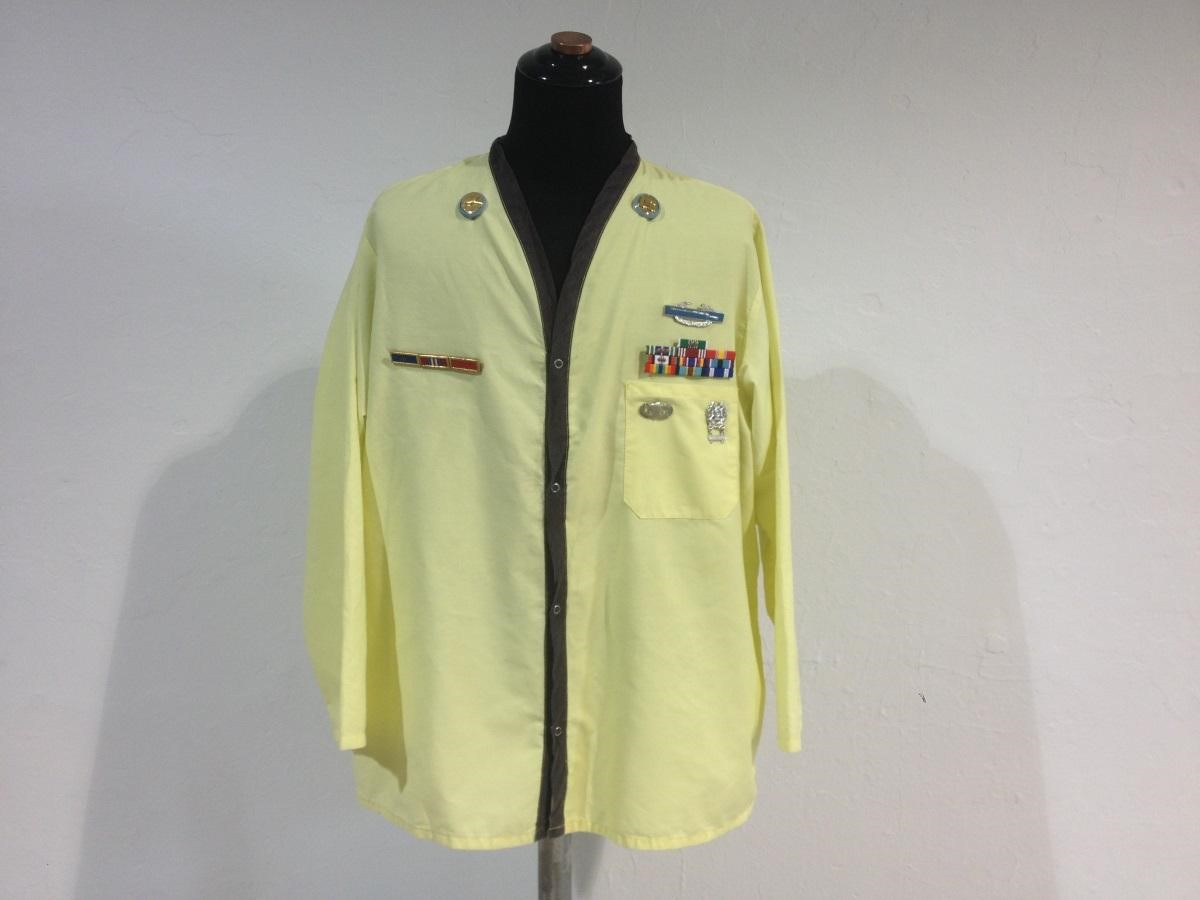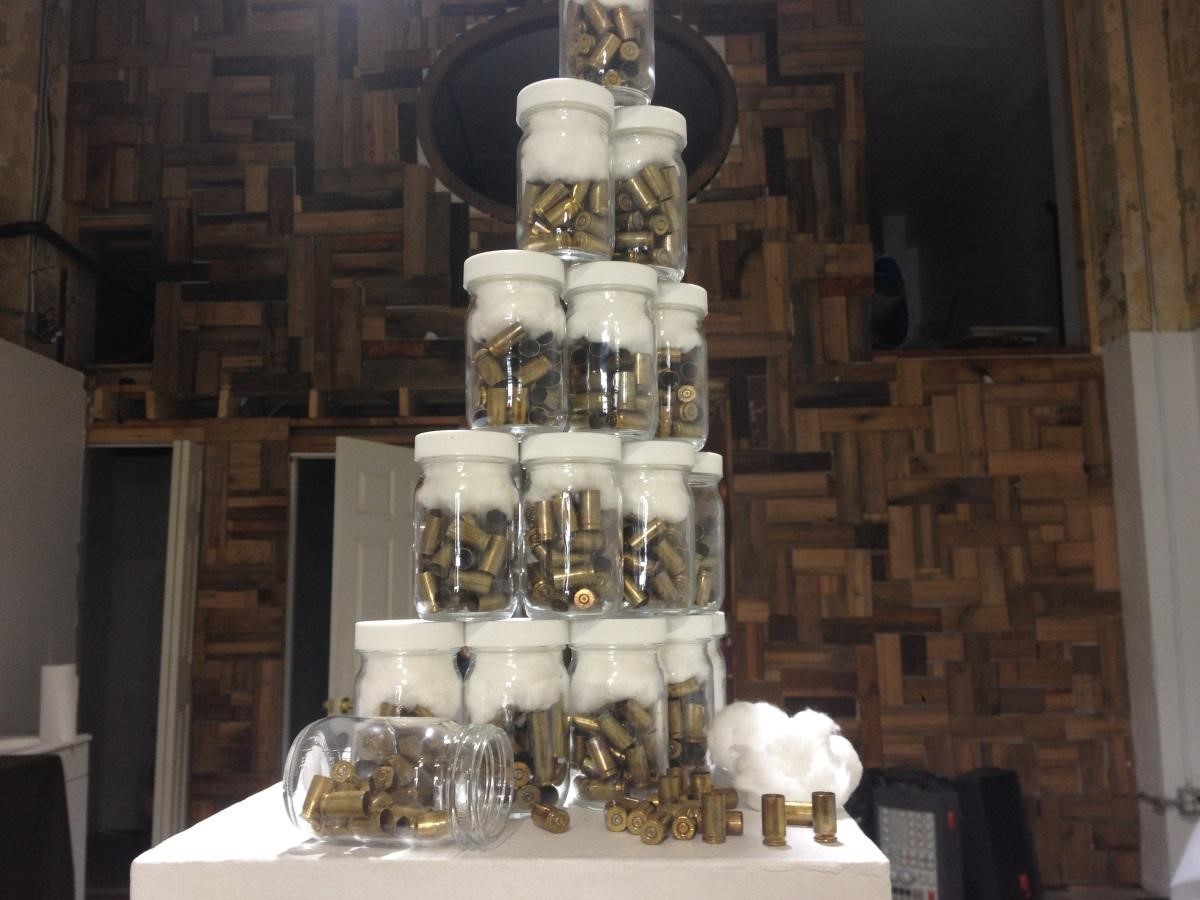Art Exhibit Focuses On How Veterans Are ‘Left Out’ Of Society

Updated on Oct. 10, 2017.
Veterans returning home traumatized by war has been a societal concern throughout human history. One art exhibit now on display during Elevate Atlanta gallery is taking a very personal look at the world many of our armed forces are returning home to.
The show is called “Left Out,” and is a collaboration between husband-and-wife team Carlos Thompson and Morgan Carlisle. Thompson is a writer and veteran of the U.S. Army, with tours in Afghanistan and Haiti under his belt.
WABE Producer Myke Johns joined them when the show was mounted for the first time in 2016 at Eyedrum’s Forsyth Street gallery. The central piece of the exhibit is a flimsy yellow shirt with snaps up the front, decorated with military medals.
“This is an outfit they make you wear at the VA hospital when you go there if you’re held overnight in the mental ward,” Thompson explains as he places the shirt on the dress form.

Which is exactly what happened to him, which sparked the idea for this exhibit.
“I had an incident where I went to the VA to get some help,” Thompson says, “because I hadn’t had any kind of therapy or counseling in months. And there’s a list of questions that they ask you when you go to the VA—especially guys like me who have had the combat experience that I’ve had: ‘Do you hit your wife? Are you a violent person? Do you ever have thoughts about hurting yourself or others?’”
Thompson says that at the time, he was between jobs, at a low point, and so he admitted that, yes, there were some times when he thought about hurting others.
“And before I knew it my whole life was at a standstill,” he says.
Carlisle says Carlos was locked up for three days.
“I talked to the VA on the phone and told them that there’s nothing wrong,” Carlisle says, “Carlos is not a violent person. And they were asking questions like ‘Does he hit you? Are you afraid to be alone with him?’ And I was like ‘No!’
“And feeling that helplessness of not being able to have any control of getting him out, by the time he got home, it was like ‘thank god you’re here!’”
The idea to make the incident into an art exhibit came immediately upon Carlos’ arrival at home.
“I took the outfit and I was like ‘I’m going to tell the world about this,’” Thomson says. “So that’s what I did. I took my dress uniform, all the medals that I actually earned in the military and I put them on this outfit.”
Carlos Thompson did three tours with the US Army. “Left Out” focuses on his first tour in Afghanistan.
“I was actually sent to Nuristan, which is kind of a no-man’s-land in Afghanistan,” Thompson clarifies. “It was in the Korengal. I stayed in a COP (a combat outpost) now called COP Lowell, but it was next to a village called Kamu.”
“A lot of legendary firefights took place there. The documentary ‘Restrepo’ comes out of that area. That was my first deployment and it lasted over 14 months, almost 15 and it was absolutely horrible. It was a life-changing experience.”
And the difficulty that fighting men and women sometimes face in readjusting to civilian life once they’re home from those life-changing experiences is at the heart of “Left Out.”
The title refers to certain members of the veteran community.
“[They’re] kind of that veteran uncle that sits in the corner of a barbeque and doesn’t really talk to other people,” Carlisle explains. “You leave yourself out of spaces because people don’t understand what you’re going through.”
The exhibit attempts to put audiences in that mindset in a number of ways — through film, audio, photographs and artifacts. Perhaps the most striking image in the gallery is a stack of glass pill bottles — bottles which once contained medication meant for Carlos — now filled with bullet casings.

“The word is on the street between all of us: we are being overmedicated,” Thompson says.
“Carlos would go to the VA just for a checkup or to check in with them, and they would start sending these bags full of pill bottles,” Carlisle says. “And we didn’t even know what all of they were, we’d have to look them up.
“And a lot of those medications lead to depression, lead to suicidal thoughts and tendencies.”
According to the VA, in 2014, an average of 20 Veterans died from suicide each day, and risk for suicide was 21 percent higher among Veterans when compared to U.S. civilian adults.
While Thompson and Carlisle are creating a space sympathetic to veterans with the “Left Out” exhibit, they’re also hoping the show helps build bridges between veterans and civilians.
“We have a lot of friends here in the art world who are artists just like us, and we don’t share the same political views, and I’m cool with that,” Thompson says.
“But we’re starting to get in a political climate where some people aren’t comfortable having friends who don’t share their political views. And it scares me because I’ve been to Haiti and I’ve been to places where when that happens, bad things happen.”
Thompson brings up an argument it sounds like he’s had a number of times before, which is: as a person of color, why risk your life serving a country where the assertion that “Black Lives Matter” is still contentious?
“As another person of color or as another marginalized group you are fighting for rights, you are fighting for this country to take care of you the way you feel you as a group deserve to be taken care of,” he says. “Now, I feel like I made a very big sacrifice for this country to prove that I was a loyal individual and that I deserve to be treated with respect in this country. And then this happens to me.”
Here, he gestures toward the hospital shirt.
“So if we’re in a country that does that to people like me, they’re never going to give you what you’re looking for. And that’s why we need to band together and have more things like this to create conversations about how we can work together to change everything.”
It’s a noble ambition. But at the center of “Left Out,” there is still very raw feelings about the trauma of combat, and about mistreatment at home. Asked whether he thought putting that on the walls of an art gallery helped him, Thompson takes a long pause.
“I wanna say it does,” he finally says. “My friend’s grandmother told me something that I found very interesting. She told me that ‘you guys were there for a reason. And though a lot of people have become broken from this experience, the Devil out of his own arrogance taught you how to fight himself.’
“My sense of camaraderie for other veterans, this sense of having to take care of them because that’s what I did and that’s what I’m supposed to do has now driven me to go through this very very painful process.
“Even now I really just want to quit,” Thompson says. “I don’t want to do this. It hurts so bad, it’s super painful, but they need this. Because not everyone has a Morgan who will sit down with them and be like ‘Hey, this is what I’m going through, let’s process this.’ And I want to be the person to do that. I want to show them that I’m here for them.
“We’re brothers, I’m going to do this.”
“Left Out” opens at Gallery 72 on Marietta Street on Oct. 14 as part of Elevate Atlanta. Carlos Thompson and Morgan Carlisle will also be taking part in a panel called “Left Out: The Long March to Freedom” at 7 p.m. on Oct. 17 at the gallery.





